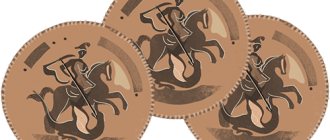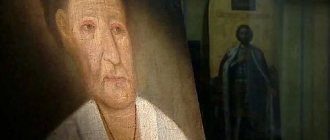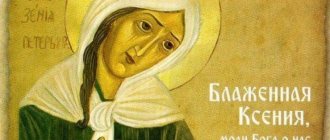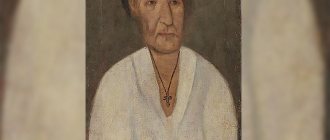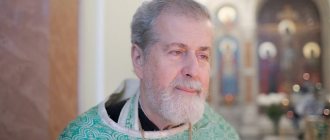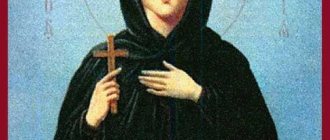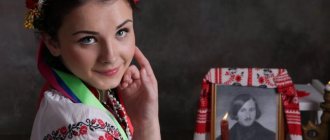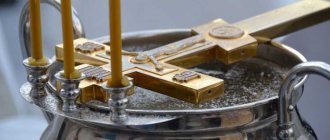The "SP" correspondent visited one of the most touching Russian saints - Blessed Xenia of St. Petersburg
The first time I came here was last year, when I was 26 years old. I came from Saratov here, to Vasilyevsky Island, not to ask for strong love, family happiness or children. I wanted to bow to the woman who, during her lifetime, acquired such an extraordinary gift of love - love for God, and through Him - for her husband, and who for his sake took upon herself such an unbearable (for an ordinary person) cross - foolishness.
I found myself at the Smolensk cemetery just before the chapel closed, miraculously making it to the evening service. It was just a miracle - an hour ago I was in the Alexander Nevsky Lavra, where they showed me the way here - to the grave of Xenia of Petersburg.
For those who know St. Petersburg, it is clear that it is almost impossible to get from the city center to Vasilyevsky Island in an hour. This means that Ksenia helped me and prayed for me. She probably knew how much I needed her...
“Whoever knew me, let him remember my soul for the salvation of his soul,” the words are inscribed in gold paint on a white marble slab placed on the street wall of the chapel. To remember and bow - this is exactly why I came here both the first and second time - this year
Unexpected meeting
A lady was walking along the street of St. Petersburg - not poor, well dressed, just like a lady. Suddenly a strange woman stood in front of her - tall, thin, in a green jacket and a shabby red skirt, gray hair escaping from under a white scarf, torn shoes on her bare feet. She stood up and extended her hand to the lady.
At first the lady was afraid of the stranger, but then she realized: she’s just a beggar asking for alms! She reached into her wallet: “Now, honey, I’ll give it to you now...” - but the stranger shook her head: no, they say, that’s not it. The lady looks, and the tramp has a coin in her palm! That is, she wants to give the lady money.
But why?
- Take a nickel! — the unusual stranger said quietly in a slightly hoarse voice. - Here the king is on horseback... It will go out...
She said and left so quickly, as if she had disappeared into thin air.
The lady looked at the copper coin in confusion. What "king"? What will “go out”? She shrugged her shoulders: “She must be crazy...” She squeezed the patch in her hand and moved on.
That lady's house was two blocks away. Nice house, big. Now she will come home, sit down on the sofas, order her to make some coffee and finally take a break from the heat...
But - what is this? The woman suddenly smelled smoke. I heard screams... I turned the corner - fathers! Fire! Her house was on fire, flames were shooting out of the windows. People in military uniform held back the crowd of onlookers, firefighters pumped water, but it was clear that it was unlikely that anything would be extinguished here.
The woman screamed and rushed, tangling in her dress, towards the house. But, not having reached a few steps, she suddenly stood rooted to the spot. What's happening? Just now the house was completely engulfed in fire, and suddenly... the fire seemed to be “turned off”! No more flames! Only thin wisps of smoke rise from the roof.
The crowd fell silent and froze at once. The military, firefighters - everyone looked at the house, not believing their eyes.
The janitor quietly approached the lady:
- Lady, I saw Ksenyushka approaching you. What did you say?..
The woman slowly unclenched her fist and looked at the coin: “Take the nickel! Here the king is on horseback... It will go out..."
She realized that the prediction had come true. And I learned that that strange stranger with the coin was Blessed Ksenia, whom many in St. Petersburg already knew at that time.
marked by God
Over time, Ksenia turned into a living talisman of simple hard-working people, especially merchants. As soon as the blessed woman went into the shop in the morning and took some trinket, asked for a cod or a “king on horseback” (a penny), trade in the shop that day went with a bang. And vice versa, if the “former” eventually received the name Nourishing: they began to feed the poor to their fill in order to gain the favor of the holy fool, marked by God’s grace. Ksenia refused to accept alms, it was better to fold the goods and go home, since trade was not expected in the near future. The same thing happened to St. Petersburg cab drivers. Everyone knew: whoever a ragged beggar woman gets in and drives even a fathom will have a lucky day. The number of cab drivers chasing the blessed one from the St. Petersburg side reached several hundred. But Ksenia did not welcome everyone. The holy fool explained her refusal with her characteristic childish straightforwardness. “Take it, Andrei Fedorovich, as a memorial,” someone offered Ksenia a penny. - No, brother, you are cheating the customers! To another she gave a different reason: “No, I won’t go with you, you, dear man, offend the poor!” The peddlers of buns, gingerbread, apples, pies and other foodstuffs, noticing the ragged beggar woman from afar, opened their trays and impatiently waited for her to take at least something from them. And the market
What kind of “king on horseback” is this?
On small coins in those days, St. George the Victorious was depicted slaying a serpent with a spear. Blessed Xenia called this saint “the king on horseback.” She herself never asked for alms - they gave it to her, and she took the coin and immediately gave it to someone in need.
They also gave the blessed one warm clothes, worrying that the tramp lived on the street, got wet in the rain, and endured wind and frost. Only she didn’t take it, she refused. At first she wore her husband’s military uniform made of red and green fabric, and when it was completely worn out, she began to wear a red jacket and a green skirt. Or a green jacket and a red skirt. And on her feet - when she wore torn shoes, and when she walked completely barefoot.
Sometimes boys teased her and even threw dirt at her, and she brushed them off with her stick: “Here I am!” But the majority of St. Petersburg residents not only did not touch the blessed one, but loved her and invited her to come to them in every way.
Ksenia's prayer for personal petition
In Old Church Slavonic:
Oh, our great heavenly intercessor, holy blessed mother Xenia! Ask the Greatly Gifted God for your servants (names), who flow to you with hope (the content of the petition), and for help and instruction in all everyday needs and needs, and for deliverance from all troubles and sorrows. Amen.
In modern Russian:
O our great heavenly intercessor, holy blessed mother Xenia! Ask the Greatly Gifted God for Your servants (names), who flow to You with hope (the content of the petition), and for help and guidance in all everyday needs and needs, and for deliverance from all troubles and sorrows. Amen.
The Beggar Who Brings Good Luck
Who was this woman? Today we know her as Ksenia of Petersburg. And in the eighteenth century, she was listed according to documents as Ksenia Grigorievna Petrova.
Let's move back more than two centuries into the past and watch Blessed Ksenia...
Here she is walking along the bank of the canal. It opens onto a shopping area. Here there are shops and benches, hawkers walk in the crowd with belts thrown over their shoulders, on which trays are attached - trays filled with small goods...
One of the hawkers, noticing the tramp, immediately perked up and shouted: “Ksenyushka! Ksenyushka! He rushed towards her. Behind him are others. They surrounded the blessed one, vying with each other to offer their goods: “Take it from me!” “Try mine!..”
The cab drivers are right there: “Ksenyushka!.. Andrei Fedorovich! Sit down with me, I’ll give you a ride!”
And here are the shopkeepers - the doors are wide open: “You are welcome to my shop, Andrei Fedorovich! Look at my product!..” “And perhaps come to me!..”
A gray-haired woman in a headscarf calmly takes a pie from one of the trays. He takes a bite. The satisfied hawker beams and looks down on his comrades. They envy the lucky one.
And Ksenia is already entering the shop. On the shelves there are fabrics, scarves, lace... A merchant in a long shirt with a belt lays out his goods in front of a beggar, unrolls the pieces of fabric... Ksenyushka picks up a lace napkin. I looked and put it back in its place. The happy shopkeeper bows to her. And his family is nearby - everyone looks at the old beggar woman with such respect, as if some general had come to see them.
And Ksenia goes out into the street again. Two mothers with babies in their arms approach her. One hands Ksenia her child. The pale baby coughs hoarsely and cries weakly. Ksenia receives the boy carefully, kindly, and... he immediately calms down! The blessed one whispers something in his ear, strokes his head and returns it to his mother: “Nothing, dear, Andrei Fedorovich will not do anything bad. Now he’ll get better...” The happy mother wipes away her tears.
What is this? What's happening? Why so much attention to the strange poor woman? It’s just that everyone in St. Petersburg knows that Ksenia, like a guardian angel, brings good luck, success and happiness. Merchants have long noticed: whoever Ksenyushka takes something from a tray will instantly sell all his goods. Whoever comes into the store will have no end to customers all day. The cab drivers realized: whoever has Ksenia passing in a carriage, then passengers will line up and money will flow like a river. And mothers joyfully bring their children to the blessed one: the baby will sit in her arms, be healthy, and all his illnesses will go away.
But why is Ksenia called by the male name Andrei Fedorovich? To find out, you will have to go back another thirty years from the shopping area of St. Petersburg in the eighteenth century...
Akathists, troparia, kontakion and canon
Memorial Day is February 6th. Then the kontakion and troparion are read. Troparion lyrics:
“Having loved the poverty of Christ, / now enjoying the immortal meal, / exposing the imaginary madness of the world, / with the humility of the gods, you have gained the power of God, / for this you have received the gift of miraculous help,” / Blessed Xenia, I pray to God from God everything // Transfer to God.
Today the city of San Pietro rejoices slightly, / as many who mourn find consolation, / trusting in your prayers, / Benedetta Xenia, // boasting of the praise and approval of this city.”
Andrey Fedorovich
The house of Colonel Andrei Fedorovich Petrov stood on the Petersburg side - the then outskirts of St. Petersburg. Petrov and his wife Ksenia lived comfortably, received a decent salary, they had a strong farm - chickens, goats, their own carriages...
Andrei Fedorovich sang at church services in palaces and was a singer in the court choir. Sometimes even Empress Elizabeth herself listened to him.
Love and harmony reigned in the Petrov family. For several years, Andrei and Ksenia lived in perfect harmony.
And suddenly - trouble! Andrei Fedorovich suddenly dies. Ksenia at that time was only twenty-six years old. The death of her husband is a huge grief for her, but even more terrible for Ksenia is that Andrei Fedorovich did not have time to confess or take communion before his death.
Christians know: even if you have been going to confession all your life, it is still very important before meeting the Lord to once again ask Him for forgiveness for your sins, so that your soul will appear pure before God and the path to the Kingdom of Heaven will be open to it. Therefore, all believers strive to confess their sins and receive communion before their death. Ksenia’s husband did not do this, and the young woman did not know what to do: what if her husband’s soul did not find peace for itself?
Overnight, the young woman turned completely gray. For several days after the death of her husband, Ksenia did not sleep, did not eat, just sat on a chair. And then she made a decision: she would save the one she loved so much. She herself will become Andrei Fedorovich! She herself will confess his sins before the Lord and will do good deeds in his name!
Ksenia cut her hair, put on her husband’s uniform - a red and green military uniform - and went to the funeral in this form.
The people who followed Andrei Petrov’s coffin did not understand anything: why was a woman in men’s clothing walking in the crowd? They whispered: “There’s no way Ksenia Grigorievna has gone crazy...”
Someone couldn’t stand it and called out to the widow:
- How are you now, mother?
The woman turned around:
- Why are you bothering her? My Ksenyushka has died and is resting peacefully in the cemetery. And I, sinful Andrei Fedorovich, am all here.
Ever since her husband was buried, Ksenia demanded to call herself only Andrei Fedorovich. She gave up herself, everything that belonged to her, even her own name, for the sake of saving her husband’s soul.
Ksenia gave her new house to Praskovya Antonova, a widow who had previously rented rooms from her and her husband. She only asked her to let beggars and homeless people into the house for the night. Ksenia gave away both money and property. I was left with nothing.
The husband's relatives became worried that the house and fortune of the late Andrei Fedorovich were being squandered. They even appointed a special commission to recognize that the young widow had gone mad with grief. The commission talked to Ksenia Grigorievna and... became convinced that she was completely normal!
Yes, Andrei Petrov’s widow did not go crazy, as many believed. She just stopped being Mrs. Ksenia Petrova, and became a holy fool.
Real examples of the blessed one's help
Orthodox women only celebrate Xenia of St. Petersburg positively. The saint helps those who cannot get pregnant find a worthy husband. Because she has dealt with pain and loss herself, she will help women who are struggling. They turn to Ksenia and if the child is sick, the daughter cannot get married, there is no respect at work. There are thousands of grateful answers about the saint’s help, but it is better not to read them, but to directly ask for help from the saint in order to experience the miraculous effect.
Who are the holy fools?
Fools, also called blessed ones, are people who suddenly begin to behave unusually. They give up everything they have, endure hardships and reproaches, break all the rules, speak the truth - including unpleasant ones - to the face of everyone, including kings. For this they can be scolded, despised, even beaten, but the holy fools do not pay attention to this. They live a different life. Sometimes they are worse than beggars. They wear rags, walk barefoot, are cold and hungry, some put on heavy chains - iron chains and belts... They are often mistaken for crazy, but they are not crazy at all.
After all, how does a person go crazy? From illness or from severe grief or shock, he suddenly ceases to understand what is happening to him, and cannot control what he does and says. For holy fools, everything is completely different. They freely and voluntarily choose their path. If there is no meaning in the actions and words of real madmen, then in what holy fools do - in their every word, in every action - there is always meaning. Fools pray for all people, even the most sinful, save themselves and save others. With his unusual language and actions, the holy fool conveys something very important to everyone around him and who comes to him. And it is necessarily connected with faith in God. After all, it’s not for nothing that holy fools are also called “fools for Christ’s sake.” Everything they do is aimed at serving God and their neighbor.
There are many ways to serve God: someone goes as a hermit into the desert, lives in a cave or dugout, prays in a hollow or on a stone, someone performs obedience in a monastery or serves in a church. And the Lord chooses and calls someone to a special, very difficult path of foolishness suitable only for the chosen ones. You can walk along it only with the blessing of God.
Who are the blessed ones and what is their holiness?
Priest Georgy Kochetkov spoke in an interview with a MIR 24 correspondent about who the blessed ones are, what their holiness is, and why they were so revered in Rus'.
“Blessed” literally means “happy.” That is, the blessed ones, or holy fools for Christ's sake, were happy. It’s surprising: foolishness and happiness usually don’t go together with us; we don’t correlate these things. We say “blessed”, meaning that a person is a little out of his mind, and sometimes even not a little. But for Christ’s sake, a holy fool is not just some kind of deformity according to the idea of this world, not just a dislocation in relation to the prevailing mentality. Real holy fools are happy precisely because they are not guided by any cliches and standards of this world, which come and are often vicious, the priest explains.
“We often forget that the church does not glorify foolishness in general, but foolishness for the sake of Christ. And everyone who believes in Christ in this world also seems to deviate from the norm, because the law of this world and the law of the Kingdom of Heaven are not at all the same thing. Life in proximity and in the presence of the Kingdom of Heaven is one thing, but life according to the laws of this world is another. And success in these two dimensions is understood in completely different ways, with an emphasis on different concepts, criteria, and realities,” says Georgy Kochetkov.
The blessed ones, holy fools for Christ's sake, often looked like prophets. “The prophets also behaved very strangely, so people were surprised, sometimes they really thought they were crazy,” says the priest. – We often forget who the prophets are. We often understand this a little paganly, superstitiously, thinking that these are soothsayers, although a prophet is one who proclaims the will of God, the truth of God, even when it is inconvenient and unpleasant to many. Even some church leaders are afraid to talk about this prophetic principle in the church, about the fact that the Holy Spirit constantly renews church life and cleanses it of all untruths.”
Holy fools were such prophets. They guided the people, breaking all sorts of cliches and stereotypes both among the church people and in secular society. They might not have been loved, but they were obeyed - even Ivan the Terrible did not dare to touch the holy fools who exposed his crimes to his face.
For Christ's sake, holy fools are blessed, that is, happy, but especially happy - not because they have everything they want, not because they satisfied all their needs, but because the Holy Spirit shone in them and warmed everyone through them because they often spoke from the Spirit and in the Holy Spirit, says the priest.
How the blessed widow gave a son
So, having buried her husband, Ksenia Petersburgskaya went to live on the street. And in the cold, and in the heat, and in autumn, and winter, and in rain, and in snow, she was seen in the same red and green clothes. She predicted important events to those she met, surprised some, consoled others, and, of course, constantly helped people.
Once Ksenyushka looked into her former house - the same one that she gave to the widow Praskovya after her husband’s death. And there is Praskovya, sitting, sewing. The blessed one knew that the widow did not have a family, she did not intend to marry again, but she suffered greatly from the fact that she did not have children.
And then Ksenia comes to her and - right from the doorway:
“You’re sitting here, darning your stockings, and you don’t know that God is sending you a son!” Go quickly to the Smolensk cemetery!
“How so?” - Praskovya was surprised to herself, but she immediately got ready and ran, where Ksenia said: she knew that the blessed one would not just say a word.
And there’s a crowd at the cemetery! A drunk driver was riding in a cart, lost control of his horses, and hit a woman. And that unfortunate woman was just pregnant... Praskovya made her way through the crowd... And now she’s coming out, and in her arms is... a child wrapped in a scarf! The woman, it turns out, gave birth to a son, and, unfortunately, died. The police did not find the father, but Praskovya took the baby and adopted him. And so it turned out that the blessed one was right again: the Lord gave a child to a childless woman.
Ksenia healed from serious illnesses, helped those who had dreamed of it for many years to get new housing, through her prayers people were acquitted in an unfair trial, she miraculously introduced single people who, without her help, would never have met or gotten married... More In her life, rumors about the extraordinary holy fool, a helper to all those who suffer, spread far beyond the borders of St. Petersburg.
Like fitness...
Often here you meet those who perform their own rituals, known only to them, near the chapel. People walk around the building three times, but do not go inside the temple. “This is the line for the chapel, and we don’t have to go there yet,” the girl instructs her friend, who tried to take the line among the parishioners. “It’s not done like that, first you have to put a note in the box, then walk around the chapel three times, and only then go in.” I know."
Surprisingly, this ritual, which “must” be performed near the grave of St. Xenia the Blessed, is described in one of the “Orthodoxy” groups on the VKontakte social network. So the guides, together with groups of people, appear, walk around the chapel three times - and run away further. “This is something pagan, you don’t need to do this, but the main thing is to approach the relics?”, foreigners ask the people standing next to them in line to the chapel, having difficulty constructing complex sentences in Russian. “Don’t pay attention to them, let them walk in circles,” the old woman reassured the foreigners.
Before the start of the evening service, Archpriest Igor was able to spare two minutes for me to answer my questions.
— What should you not do near the grave of Xenia of St. Petersburg, and how should you behave? - I only have time to ask.
After listening to me, the priest stood in the center, so that other parishioners gathered for the evening service could hear him:
— You shouldn’t walk around the chapel of Xenia of St. Petersburg - it’s like fitness. When coming here, you should not do everything related to paganism. Rus' is baptized, but not enlightened... And it is worth observing the dress code, girls should not come in trousers. “After which the archpriest took sprigs of flowers from the vase and handed them to me and several other parishioners:
“Here are some flowers for you for coming to visit the saint.” This is for you from the Blessed Xenia,” the priest said, holding out a branch of irises, and added that many believers forget that other saints also rest in the Smolensk cemetery.
Where does the blessed one spend the night?
At some point, the St. Petersburg police became interested in Ksenia. She seems to be a harmless beggar, but still people follow her... We need to follow her, find out how she lives, otherwise something illegal might happen... Where, for example, does she spend the night?
Trace it. We found out. It turned out that at night Ksenia went out of town and prayed right in the field, on her knees. Until dawn! How she withstood the cold, snow, and wind is unclear.
Here's what else turned out to be true. At that time, a stone church was being built near the Smolensk cemetery. One morning the workers come - what is it? Someone dragged a whole mountain of bricks to the very top of the church! And in the following days the same thing happened again... It turned out that blessed Ksenia, a weak-looking, thin, elderly woman, was that tireless worker who every night lifts heavy bricks up stairs and planks for the masons!
Immortality
Apparently, no one knows the exact date of death of Blessed Xenia. According to various sources, she died between 1777 and 1803. And the nationwide pilgrimage to her burial place at the Smolensk cemetery began in 1820. Visitors even stole the grave mound: the soil from her grave was considered sacred. The stone slab placed in place of the mound was also dismantled into pieces. And the next one, and the next one. But instead of the carried away pieces of the slab, pilgrims began to leave donations. And in the middle of the 19th century there were enough of them to erect a chapel over the grave, which immediately turned into one of the most popular places of pilgrimage in St. Petersburg. People came from all over the city asking for help in troubles and in search of answers to pressing life questions. During the Soviet period, the city authorities walled up the grave and placed a shoemaker's workshop in the chapel. But the shoemakers could not work there: everything fell out of their hands. A sculpture workshop moved into the chapel - the same result. Then the chapel was surrounded by a fence. But the flow of pilgrims did not dry up even during the years of state atheism. People began leaving notes with requests on the fence, just like on the Western Wall in Jerusalem. They asked for different things: to get rid of sin or illness, to go to college or get married, to turn away from drunkenness, to restore the joy of life... They even asked to save the world and stop wars. But the righteous Ksenia is famous not only for her help in adversity and life’s difficulties - she can severely punish for blasphemy. There are rumors about one of the guards of the Smolensk cemetery, who, being quite drunk, argued with friends that he would “sleep with blessed Ksenia” and stayed overnight at her grave. The next morning he discovered a strange mold on his clothes and body, and a few days later his health began to rapidly deteriorate. They say that they saved the guy with great difficulty in one of the military medical institutes. The symptoms of his illness were strangely similar to the legendary curse of the pharaohs that afflicted those present at the opening of Egyptian tombs and sarcophagi. There are also a lot of modern legends about the appearance of Ksenia in a “living” guise. It is believed that in difficult, critical times for the city and country, she descends from heaven and personally helps those in need. A huge number of memories of the miraculous salvation given by a fragile elderly woman in a headscarf date back to the Great Patriotic War and the Leningrad Siege. Residents of St. Petersburg say that Blessed Ksenia still wanders around the city, indistinguishable from an ordinary pensioner with a cane. She will console someone, give advice to someone, shame someone, look at someone - and suddenly the heavy melancholy disappears, hope returns, joy awakens... Ksenia takes care of her own. He cares for the good of ordinary townspeople and, through the centuries, uses his powerful gift for their benefit.
Eyewitness accounts
Rumors that Ksenia still walks around the city on the Neva would have no right to life if they were not repeated from the lips of various people from different times with enviable consistency.
Here, for example, is a case from the distant past. Priest Konstantin Parkhomenko recalled that when he was studying at the Theological Seminary, one teacher told the following story. During the blockade, the teacher’s mother received bread cards for the entire house and distributed them among the residents. One day I discovered with horror that the cards were missing: either lost or stolen. The woman was in despair: she was threatened with execution. Then she hastily went to the grave of Blessed Xenia to ask the saint for help. My daughter (the same teacher) remained at home. Suddenly she heard someone scratching at the door. She opened it and saw: a woman was standing, lightly dressed, not for winter, in an old knitted jacket, in a worn skirt, in old-fashioned shoes. “Isn’t it your mother who lost it?” - He says and hands over a stack of papers. The girl took the bread cards and put them on the table. Mother comes running: “Where are the cards from?” My daughter told me everything. And my mother realized that Saint Xenia herself had come. And here’s what a priest told one of the churches in St. Petersburg today: “One of our parishioners greatly reveres Blessed Xenia, he works not far from the Smolensk cemetery. And when he drives home from work, almost every day he stops his car, gets out and goes to the Xenia Chapel for a few minutes to pray for his family. They waited a long time for the child. They were afraid whether he would be born healthy, there were some problems. We prayed to Xenia. A girl was born. They named her Ksenia in honor of the saint. He tells me: “One day, when I was praying at the chapel, I suddenly had a desire to call home and find out if everything was okay with the child.” He calls his wife on his mobile phone and says: “Go and see how Ksyusha is sleeping, is everything okay?” The wife says: “I just put her to bed, Ksyusha is sleeping peacefully.” - “No, still check if everything is okay, wake her up, stir her up.” The mother began to bother the girl, but she did not open her eyes and began to cough and choke. An ambulance was urgently called. It turned out that when the girl fell asleep, she began to suck on a part of the toy, and it got stuck in her throat. The child was saved, and all thanks to Saint Xenia.” Magazine: Oracle Advice No. 02, February 2022 (100th issue of the magazine) Category: Superpowers Author: Valentina Rogozhina
Tags: biography, cemetery, St. Petersburg, Vasilievsky Island, prayer, foolishness, Oracle Advice, chapel, note, hagiography, Smolensk Cemetery, Ksenia
- Back
- Forward
Miracles don't end there
Blessed Xenia died at the end of the 18th century. Almost no information has been preserved about how her last days passed. But we know for sure that until the very end, Ksenia worked for people, for God, and carried out her unusual service.
Immediately after Ksenia’s death, people began to flock to her grave at the Smolensk cemetery, asking for help. Miracles associated with her name continued - help through prayers to the blessed one came to a variety of people and her veneration increased every year.
Ksenia of Petersburg is one of the most beloved saints not only in Russia, but throughout the Orthodox world. On February 6, the day of remembrance of the blessed one, it is customary to visit the sick, especially diligently help the elderly and the poor, and console the suffering in memory of the faith and mercy with which Ksenia herself served people.
Drawings by Ksenia Vyazova
Prayer of Xenia of St. Petersburg: original text
In Old Church Slavonic:
Oh, our glorious holy blessed mother Xenia, warm for us before God in the prayer book! As before we fell to your tombstone, now, after your glorification, we resort to your relics, we ask: pray to the Lord, may He sanctify our souls and bodies, may He enlighten our minds and purify conscience from all filthiness, unclean thoughts, evil and blasphemous intentions and from all exaltation, pride and arrogance, arrogance and insolence, from all Pharisee hypocrisy, and from all our cold and evil customs; May He grant us sincere repentance, contrition of our hearts, humility, meekness and quietness, reverence, and spiritual understanding with all prudence and gratitude.
Hidden from the wise of this age, but known to God, ask our Russian country for deliverance from severe troubles, for renewal and correction of all our lives, keep us in every pious Orthodox confession the gift of the Christian faith, so that in pleasing you we may be honored all the days to sing, give thanks and glorify the Father and the Son and the Holy Spirit, the Trinity of One Essence, Life-Giving and Indivisible forever and ever. Amen
In modern Russian:
Oh, our glorious holy blessed mother Xenia, ardent prayer book for us before God! As before we fell to your tombstone, so now we, after your glorification, resorting to your relics, ask: pray to the Lord, may He sanctify our souls and bodies, may He enlighten our minds, cleanse our conscience from all filth, unclean thoughts, evil and blasphemous plans and from all exaltation, pride and arrogance, arrogance and insolence, from all Pharisee hypocrisy, and from all our shameful and evil customs; May He grant us sincere repentance, contrition of our hearts, humility, meekness and calmness, reverence, spiritual intelligence with all prudence and thanksgiving.
Hidden from the wise of this age, but known to God! Ask our Russian country for deliverance from grave troubles, for renewal and correction of our entire life, keep us in every pious Orthodox confession of the Christian faith, so that, glorifying you, we may be worthy all the days to chant, thank and glorify the Father and the Son and the Holy Spirit, the Trinity of the Consubstantial, Life-giving and Undivided forever and ever. Amen.
Parish of the Church of Xenia the Blessed
Blessed Xenia of Petersburg Home » About Temples » Patron Saints » Blessed Ksenia of Petersburg
Celebration day January 24th. February 6 n.s.
Among the people who are truly holy fools for Christ's sake, who have gone through the entire path of moral self-improvement and wholly devoted themselves to serving the Lord God, undoubtedly belongs the well-known and deeply revered saint of the 18th century - Ksenia Grigorievna Petrova, who rests at the Smolensk cemetery in St. Petersburg.
To the great regret of all admirers of the servant of God blessed Ksenia, the people's memory has not preserved for us absolutely any news about who Ksenia was by origin, who her parents were, where she received her education and upbringing. One can only assume with certainty that Ksenia was not of a simple origin, for she was married to Andrei Fedorovich Petrov, who held the rank of colonel and served as a court singer.
Here is a short story of her life. She was born, as far as can be established, in 1732 (according to other researchers - in 1731), from pious and noble parents; Her father's name was Gregory, and her mother's name is unknown. Upon reaching adulthood, Ksenia Grigorievna married the court singer, Colonel Andrei Fedorovich Petrov, and lived with her husband in St. Petersburg in a small house on the Petersburg side, bought by Andrei Fedorovich with his wife’s dowry. This house stood on the street, which was called Andrei Petrov Street, after the name of the homeowner. The current name of the street is Lakhtinskaya. The house of the court singer, Colonel Petrov, stood at the intersection of Lakhtinskaya Street and Bolshoy Prospekt (now the site of the house is a vacant lot).
It did not take long for the Lord to judge the young couple to walk together along the path of life - death separated them: Andrei Fedorovich fell ill with a “fever”, “burned” (probably he had typhus) and died, leaving Ksenia Grigorievna a widow in the 26th year of her life. Before his death, her husband bequeathed to her: “Serve the Lord our God, glorify His All-Good Name...”. Ksenia lived with her husband for only 3.5 years; they had no children.
The completely unexpected, sudden death of her beloved, thriving husband struck Ksenia Grigorievna so much, had such an impact on the young 26-year-old childless widow that she immediately seemed to forget everything earthly, human, all the joys and pleasures, and as a result of this she seemed crazy to many, lost her mind. Even her relatives and friends began to look at her this way, and especially after Ksenia gave away absolutely all her property to the poor, she gave the house to her good friend Paraskeva Antonova. Ksenia's relatives even submitted a petition to the superiors of the deceased Andrei Fedorovich, asking not to allow Ksenia to give away her property in madness. The superiors of the deceased Petrov summoned Ksenia to their place, but from conversations with her they were completely convinced that Ksenia was completely healthy, and therefore had the right to dispose of her property as she pleased.
This is how carnal people looked at God’s servant Xenia, not understanding that a great revolution had taken place in her soul since the death of her husband, a complete rebirth of the carnal into the spiritual took place. Dementia and true foolishness have nothing in common. On the contrary, in order to decide on foolishness, the greatest courage is necessary, that is, the presence in a person of a highly developed will, and a clear consciousness both about life in general and about the chosen path.
And indeed, the unexpected death of her beloved husband, in whom her whole goal and all her interest in life was concentrated, clearly showed Ksenia how fragile and how vain earthly things were. She immediately realized that there could be no true happiness on earth, that everything earthly served only as a hindrance, an obstacle to achieving true happiness in heaven, in God.
That is why the servant of God Ksenia, immediately after the death of her husband, decided to free herself from everything earthly, from all worldly attachments: she distributed her property to the poor, gave the house to Mrs. Antonova, and she herself was left with absolutely nothing, so that nothing would serve as an obstacle to her achieving true happiness in heaven, in God. To achieve this happiness, she chose the difficult path of foolishness for Christ's sake. Dressed in her husband’s suit, that is, putting on his underwear, caftan, camisole, she began to assure everyone that Andrei Fedorovich had not died at all, but that his wife Ksenia Grigorievna had died, and never afterwards responded if she was called Ksenia Grigorievna, but always responded willingly if she was called Andrei Fedorovich.
There is an opinion that the blessed one spent several years in the Alekseevsky convent near Arzamas, founded by the Monk Theodore of Sanaksar (Ushakov).
Living in St. Petersburg, Ksenia did not have any specific place of residence. For the most part, she spent the whole day wandering around the St. Petersburg side in the area of the parish of the Church of St. Matthew the Apostle, where at that time poor people lived in small wooden houses. The strange costume of a poor, barely shod woman, who had no place to lay her head, her allegorical conversations, her complete meekness, and gentleness often gave evil people and especially street urchins a reason and courage to mock and laugh at the blessed one. But before the blessed one there was always the image of the Sufferer - Christ, who meekly endured insults, spitting, strangling, crucifixion, and death. That is why the blessed one just as resignedly endured all kinds of mockery of herself.
Only once, when Ksenia had already begun to be revered as a saint of God, did the residents of the St. Petersburg side see her in terrible anger. The street boys, seeing the holy fool, as usual, began to laugh at her and tease her. The blessed one endured this without complaint. But evil children did not limit themselves to bullying. Seeing the resignation and defenselessness of the blessed one, they, along with mockery, began to throw dirt and stones at her. Then, apparently, the blessed one did not have enough patience. Like a whirlwind she rushed after the evil boys, threatening them with her stick, which she always carried with her. Residents of the St. Petersburg side, seeing the blessed one in terrible anger, were horrified by the act of homeless, evil children and immediately took all measures to ensure that no one offended the blessed one.
Little by little, we got used to the strangeness of the blessed one and realized that she was not a simple beggar, but something special. Therefore, many began to feel sorry for her and tried to help her in some way. This pity especially began to manifest itself from the time the blessed woman’s caftan and caftan completely decayed, and she began to dress in miserable rags in winter and summer, and wore torn shoes on her bare feet, swollen and red from the frost. Seeing the barely dressed, wet or frozen holy fool, many gave her warm clothes, shoes, alms, but Ksenia never agreed to put on warm clothes and spent her whole life in pathetic rags - a red blouse and a green skirt, or, conversely, - in a green blouse and a red skirt. She also did not accept alms, but only took from good people the “king on a horse” (kopecks with the image of a horseman), and immediately gave this “king on a horse” to the same poor people as she herself.
Wandering all day through the dirty, unpaved streets of St. Petersburg, Ksenia occasionally visited her friends, dined with them, talked, and then went out into the street again. Where she spent her nights remained unknown for a long time. Not only the residents of the St. Petersburg side became interested in this, but also the local police, for whom the unknown location of the blessed one at night even seemed suspicious. It was decided, at all costs, to find out where this strange woman spends her nights, and what she does then.
Both the residents of the St. Petersburg side and the local police were able to satisfy their curiosity and calm down.
It turned out that Ksenia, no matter what time of year, no matter what weather, goes to the field for the night, kneels here to pray and does not get up until sunrise, alternately making prostrations to all four cardinal directions.
Another time, workers who were building a new stone church at the Smolensk cemetery began to notice that at night, during their absence from the construction site, someone was dragging up whole mountains of bricks.
The workers marveled at this for a long time and were perplexed for a long time. Finally, they decided to find out who this free, tireless worker could be, carrying bricks for them every night? It turned out that it was the servant of God, blessed Ksenia.
- When do you sleep, Andrei Fedorovich? - they asked the blessed one.
“We’ll have time to sleep in the ground,” she answered. Blessed Ksenia took great care that the foundation of the church was laid especially firmly.
“She will have to endure a lot,” she said, “but she will resist... Nothing...
Indeed, during the flood of 1824, when the cemetery was destroyed, many crosses and graves were demolished, and cemetery books were destroyed, the temple was in great danger, but still survived.
Perhaps the blessed one accomplished many other feats unknown to the world. Unfortunately, she had no one with her to witness them.
Alone she made her life's journey. Meanwhile, this path was long: she lived for 45 years after the death of her husband, for 45 years she waged a tireless struggle against the enemy of humanity - the devil and with the pride of life!
Where, almost barefoot and barely dressed, blessed Xenia gave rest and rest to her body throughout her wanderings remained known only to the Lord God. We can only marvel at how she, old and weak, could withstand our torrential, bone-piercing autumn rains, our terrible, biting frosts, when birds freeze in flight and well-dressed, young, healthy people easily freeze! It was necessary to possess a superhuman organism or to carry within oneself such a strong, inner, spiritual heat, such a deep, undoubted faith, in which the impossible becomes possible.
But remembering the great saints of God, who, by the power of their faith, performed wondrous, unbearable and incomprehensible miracles for the human mind, let us not consider the blessed woman’s deeds unprecedented, impossible for man in the flesh. Blessed Xenia really had such a faith in which everything is possible, and through great humility, the feat of spiritual and physical poverty, love for her neighbors and prayer, she acquired the grace-filled gift of clairvoyance. With this gift, Ksenia helped many in the matter of life and spiritual salvation, as evidenced by well-known cases preserved in the memory of residents of the St. Petersburg side:
1) One day the blessed one, having gone to visit the merchant Krapivina, talked with the hostess and accepted treats from her. Feeling sorry for the young merchant's wife, who received her so cordially, and foreseeing the latter's imminent death, Ksenia wanted to tell her about the need for proper Christian preparation for death. Therefore, when she entered, she said publicly, among other things: “The nettle is green, but soon it will wither.” All of Krapivina’s guests who heard this did not pay due attention to Ksenia’s words, but later, after the sudden sudden death of the young merchant’s wife, they remembered these words and were very amazed and shocked.
2) Another time, Ksenia comes to her good friend Paraskeva Antonova, to whom she had previously given her house, and says to her: “You’re sitting here darning your stockings and don’t know that God sent you a son! Go quickly to the Smolensk cemetery!”
Antonova, who had known the blessed one well since her youth, knew very well that a word of untruth never left Ksenia’s lips, and therefore even now, despite the strangeness of her words, she immediately believed that something special must really have happened, and hastily ran to the Smolensk cemetery.
On one of the streets of Vasilyevsky Island near the Smolensk cemetery, Antonova saw a large crowd of people. Drawn by curiosity, Antonova approached the crowd and tried to find out what happened here.
It turned out that some cab driver knocked down a pregnant woman, who immediately gave birth to a boy on the street, and immediately died. Taking pity on the child, Paraskeva Antonova immediately took the child to her place. It was not possible to find out who his deceased mother was, who his father was, despite the intense efforts of both the St. Petersburg police and Antonova herself. She gave him an excellent education and upbringing. Subsequently, he became a prominent official and until his death he took care of and rested his adoptive mother, being for her the most revered and ardently loving son. He also treated with deep reverence the memory of the servant of God, blessed Xenia, who showed so much kindness to his adoptive mother and took such part in the fate of him, who was barely born and already left a complete orphan.
3) Not far from the chapel of the servant of God Ksenia there is the grave of Evdokia Denisyevna Gaidukova, who died in 1827. This Gaidukova was one of those people whom the servant of God Ksenia loved and sometimes visited. One day, God's servant Ksenia came to see her in the pre-dinner time. Delighted by her arrival, Evdokia Denisyevna immediately hurried to set the table, seated Ksenia at the table and began to treat her with what God had sent. Lunch is over. Evdokia Denisyevna began to thank Ksenia for her visit and apologize for the bad treat.
“Don’t blame me,” she said, “darling, Andrei Fedorovich, I have nothing else to treat you with, I didn’t prepare anything today.”
“Thank you, mother, thank you for your treat,” answered Ksenia, “but why lie? After all, you were afraid to give me ducks!”
Evdokia Denisyevna was very embarrassed; She actually had a roast duck in the oven, which she was saving for her absent husband. Evdokia Denisyevna immediately rushed to the stove and began to take the duck out of it. But Ksenia stopped her: “No, no, what are you talking about! No, no, I don't want duck. After all, I know that you are happy to treat me to everyone, but you are afraid of your mare’s head. Why make him angry?
Ksenia called Evdokia Denisyevna’s husband Mare’s Head, whom she really did not like for his drunkenness, rude character and foul swearing when drunk.
4) Among the acquaintances of the servant of God Ksenia, whom she sometimes visited, also belonged to the Golubev family, consisting of a widowed mother and a 17-year-old beautiful daughter. Ksenia loved this girl very much for her meek, quiet disposition and kind heart. One day Ksenia comes to visit them. Mother and daughter were sitting at the table and making coffee. “Eh, beauty,” said Ksenia, turning to the girl, “you’re making coffee here, and your husband is burying his wife on Okhta. Run there quickly!” “How so?! - the girl answered. - Not only do I have a husband, but I don’t have a fiance either. And here is some husband of mine, and even his wife, burying him?” “Go,” Ksenia answered angrily, not liking any objections.
The Golubevs, who knew well that Ksenia never says anything in vain, and, considering her to be a saint of God, immediately obeyed the order of the blessed one and went to Okhta. Here they saw that a funeral procession was heading towards the cemetery.
The Golubevs got mixed up in the crowd of mourners and went with the procession to the cemetery. They buried a young woman, the wife of a doctor, who died from an unsuccessful birth. The liturgy began and ended, then the funeral service. The deceased was carried to her final resting place. The Golubevs followed the coffin.
The burial was over. People began to go home. The Golubevs also went.
But then they unexpectedly came across a young widower sobbing bitterly, who, at the sight of the grave mound over the ashes of his beloved wife, lost consciousness and fell senselessly into the arms of Golubev, who ran up to him. The latter tried to bring him to his senses, met him, and a year later young Golubeva became the doctor’s wife. She lived happily and serenely with her husband until a very old age, at the time of her death she strictly bequeathed to her children to preserve the grave and honor the memory of the servant of God, blessed Xenia.
5) One day Blessed Xenia met a pious woman on the street, an acquaintance of hers, stopped her and, handing her a copper coin with the image of a horseman, said: “Take the coin, there is a king on a horse; will go out!” The woman took the nickel, said goodbye to Ksenia and, wondering what her strange words meant, went home. But as soon as she entered the street where she lived, she saw that her house was on fire. Before she could reach her house, however, the flames were extinguished. Only then did she understand what the words of blessed Ksenia meant: “Take a nickel; will go out!”
6) Everyone knows that Empress Anna Ioannovna, wanting to strengthen the Russian throne for the offspring of her father, Tsar Ivan Alekseevich (brother of Peter the Great), summoned her niece Anna Leopoldovna, gave her in marriage to Prince Anton Ulrich and, when from this marriage was born son John (1740), then appointed him as her heir. After the death of Anna Ioannovna, John I Antonovich was indeed proclaimed Emperor (1740). A year after this, namely from November 24 to 25, 1741, a coup d’état took place in Russia. The daughter of Peter the Great, Elizaveta Petrovna, was proclaimed empress.
Ivan Antonovich was imprisoned in the Shlisselburg fortress, and his parents were exiled to Kholmogory, where they died. The unfortunate Ivan Antonovich languished under strict supervision in the Shlisselburg fortress for about 23 years. In 1764, already during the reign of Empress Catherine the Great, one of the guard officers, Mirovich, decided to free Ivan Antonovich from captivity and proclaim him Emperor. But Mirovich's attempt failed; other officers remained loyal to the Empress. During the clash, Ivan Antonovich was killed.
Three weeks before this sad event, blessed Ksenia began to cry bitterly every day and all day long. Everyone who met her, seeing her in tears, felt sorry for her, thinking that someone had offended her, and asked her: “Why are you, Andrei Fedorovich, crying? Has anyone offended you? The blessed one answered: “There is blood, blood, blood!” There the rivers are filled with blood, there are bloody canals, there is blood, blood,” and she began to cry even more. No one understood what became of the always calm and complacent blessed one. No one understood her strange words. Only three weeks later, when word spread throughout St. Petersburg about the painful death of Ivan Antonovich, everyone realized that with her crying and words: “There the rivers are filled with blood, there are bloody canals, there is blood, blood,” the blessed one predicted the painful death of the once Emperor John I Antonovich.
7) On the eve of the Nativity of Christ on December 24, 1761, Blessed Ksenia spent the whole day running through the streets of the St. Petersburg side and loudly shouted everywhere: “Bake pancakes, bake pancakes; soon all of Russia will be baking pancakes!”
Everyone who saw the blessed one was perplexed, what did her care and fussiness mean, what did her words mean? So no one understood the strange words and behavior of the blessed one. The next day, that is, December 25, 1761, terrible news suddenly spread throughout St. Petersburg: Empress Elizaveta Petrovna unexpectedly died. Only then did it become clear to everyone that the blessed one predicted the death of the Empress.
Undoubtedly, many other cases of insight were revealed in the servant of God Xenia; Unfortunately, news of these cases has not survived to us. But the above are already quite enough to see that the blessed one truly possessed the miraculous gift of knowledge of the future.
The rumor about the strict ascetic life of Blessed Xenia, about her kindness, meekness, humility, complete non-covetousness, about her wonderful gift of clairvoyance, spread widely throughout St. Petersburg. Everyone began to look at her as a saint of God, as a great ascetic; They began not only to pity her, but also to deeply respect and honor her, they began to marvel and be touched by her strict, ascetic life.
That is why merchants, townspeople, officials, and other inhabitants of the St. Petersburg side were sincerely glad to receive the blessed one in their house, especially since everyone began to notice that no matter what house or family the blessed one visited, gracious peace and happiness always settled there .
Merchants noticed that if the blessed one went into a shop where there had been no trade until that time, and took some insignificant thing from the items on sale - a nut, a gingerbread cake, then the shop began to sell well, because people were in a hurry to buy something in that very place. the shop where the blessed one looked.
The cab drivers noticed that if one of them managed to carry the blessed one even a few steps, then his ride went well all day and he made a good profit. That is why the cab drivers, having seen the blessed one from afar, raced to her in their carriages and begged her to at least sit in their carriage, in the full conviction that this would give them a good income. And the driver who managed to carry the blessed one in his carriage was extremely happy.
Mothers noticed that if the blessed one caresses or rocks a sick child in a cradle, he will certainly recover. That is why all of them, seeing the blessed one, hurried to her with their children and asked her to bless or caress them, in the confidence that the child who received affection or blessing from the blessed one, or whom she simply stroked on the head, would certainly be healthy and happy.
And thus, this ascetic lived for 45 years after the death of her husband in constant striving for true happiness in God, in constant struggle with the enemy of the human race and in constant readiness to do good to one and all. During all this time, not only did she not have a place to lay her head, but she did not even have clothes or shoes with which to cover and warm her chilled body. Despite this, she was quite happy. Like a bird of heaven, she flew around the St. Petersburg side during the day, wanting to provide some kind of service to everyone, and at night she entered into conversation with the Lord God Himself, indulging in prayer and other feats. Meekness, humility, kindness constantly shone on her face, exhausted by labor: it was clear that the soul of the blessed one was far from the world, that although her body was still on earth, her spirit was in heaven, where she tirelessly strived.
And now this ascetic was no longer on earth. The hour came when the Lord was pleased to release her from the struggle with the world and take her to Himself in heaven.
| The tomb of Blessed Xenia of Petersburg in the chapel named after her at the Smolensk cemetery. |
Time of death and burial of Saint Xenia the Blessed. Honoring her memory
To the great regret of all admirers of blessed Xenia, absolutely no news has survived to our time about the time and circumstances of the death and burial of the servant of God Xenia. Only on the basis of certain data can certain assumptions be made with greater or lesser probability.
Researchers of her life, despite the most thorough, repeated searches for records of the day of death and burial of Ksenia Grigorievna Petrova or Andrei Fedorovich Petrov in the Murals of the buried, stored in the archives of the Smolensk cemetery, starting in 1777, could not be found.
| Chapel of Blessed Xenia of St. Petersburg. Modern look |
It can thus be assumed that Ksenia died before 1777. But this is contradicted by the surviving news that Ksenia carried bricks at night to the newly built church at the Smolensk cemetery, and such a church could only be the existing Church of the Smolensk Mother of God. This church began construction in 1794 and was consecrated in 1796. Therefore, during these years, blessed Xenia was still alive.
If we assume that Ksenia carried bricks to build one of the churches that previously existed in the Smolensk cemetery, then this assumption is contradicted by the fact that all the churches that previously existed in the cemetery were wooden, cold, without stoves.
It is most likely to think that Ksenia actually carried bricks for the construction of the Church of the Smolensk Mother of God. As for the lack of records of her death and burial in the cemetery paintings, this is easily explained, on the one hand, by the carelessness with which the records of those buried were kept at that time; This is precisely why many persons about whom it is reliably known that they are buried in the Smolensk cemetery do not appear in the Murals (for example, the Knights of the Order of Malta, the mass of people who died of cholera in 1848 and others), and on the other hand, the assumption is very likely that all the dead who were not buried in the cemetery were not included in the cemetery records of those buried at all. If this is so, then Ksenia was buried not in the cemetery, but somewhere in the parish church; this assumption can be considered quite probable.
Some other data also indicate the end of the 18th century or even the beginning of the 19th century as the approximate time of Xenia’s death:
1) the day of death of Empress Elizabeth Petrovna, December 25, 1761, predicted by Ksenia;
2) dates on Ksenia’s gravestone: “She left behind her husband for 26 years, wandered for 45 years, and a total life of 71 years”;
3) year of death of Ksenia’s contemporary - Evd. Den. Gaidukova - 1827.
Comparing all these data, as well as the year of construction of the Smolensk Church, one can think that Xenia died no earlier than 1794 (the time of construction of the church) and no later than 1806 (1761 - the time of death of Empress Elizabeth Petrovna - add 45 years of Ksenia’s wandering - 1806 year).
It is precisely these years that can be considered the time of Ksenia’s death; therefore, her birthday falls on 1719 - 1730. Some researchers consider the year of the blessed one’s death to be 1802, and the year of her birth to be 1731. In any case, it is still impossible to accurately determine the year of birth and year of death of the blessed one.
As for the circumstances of the death and burial of the servant of God Xenia, again due to lack of data, it is difficult to say anything definite about this. But, taking into account the deep respect and love that the blessed one enjoyed among all the residents of the St. Petersburg side, taking into account that even during her life, the blessed one was revered as a servant of God, one can think that her burial was unusually solemn. It is safe to think that all the residents of the St. Petersburg side, where the blessed one lived, and in general, everyone who knew her during her lifetime, considered it their duty to give the last kiss to the deceased, say goodbye to her and accompany her to her final resting place.
Whether there were any special, significant manifestations of help from the blessed one is unknown. In any case, even if there were no such manifestations, which we cannot at all say, nevertheless all the admirers of the deceased, all who received some kind of help from her, some kindness during her life, tried to thank her with their prayers after her death for all the good that was shown to them, they tried not to interrupt spiritual communication with her even after her death. That is why, probably, one can think that from the very first day of the blessed one’s burial, her grave was visited by many, many people who came to pray for her repose.
